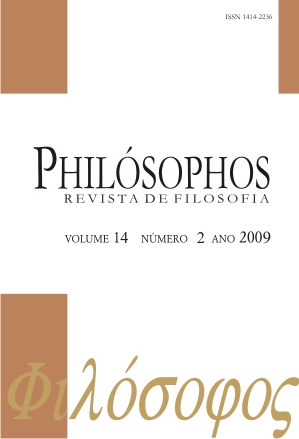TRÊS CONSIDERAÇÕES SOBRE AUTOCONHECIMENTO E A TRANSPARÊNCIA DO MENTAL
DOI:
https://doi.org/10.5216/phi.v14i2.6715Palavras-chave:
autoconhecimento, autoridade da primeira-pessoa, conteúdo mental, crença, transparência.Resumo
Este ensaio apresenta as seguintes três breves considerações sobre autoconhecimento e transparência: a) a transparência do conteúdo mental é um traço característico do autoconhecimento; b) o tratamento epistemológico da transparência do conteúdo tem obscurecido a noção de autoconhecimento e o lugar que essa noção ocupa na imagem que temos de pessoa e da ação humana e; c) quando digo ter uma crença, a transparência não é um traço lógico ou epistêmico do discurso de primeira-pessoa, mas antes é uma expressão das atitudes pelas quais sou responsável. Com isso, pretendo sugerir que o autoconhecimento não é um conhecimento (que pode ser justificado e garantido teoreticamente), mas uma característica da posição de primeira-pessoa em relação a pensamentos, crenças etc. Nesse sentido, sugiro que, a partir da idéia de deliberação, um caminho interessante para discutir a noção de autoconhecimento é investigar a experiência comunicativa cotidiana.Downloads
Downloads
Publicado
Como Citar
Edição
Seção
Licença
Autores que publicam nesta revista concordam com os seguintes termos:
- Autores mantêm os direitos autorais e concedem à revista o direito de primeira publicação, sendo o trabalho simultaneamente licenciado sob a Creative Commons Attribution License o que permite o compartilhamento do trabalho com reconhecimento da autoria do trabalho e publicação inicial nesta revista.
- Autores têm autorização para assumir contratos adicionais separadamente, para distribuição não-exclusiva da versão do trabalho publicada nesta revista (ex.: publicar em repositório institucional ou como capítulo de livro), com reconhecimento de autoria e publicação inicial nesta revista.















